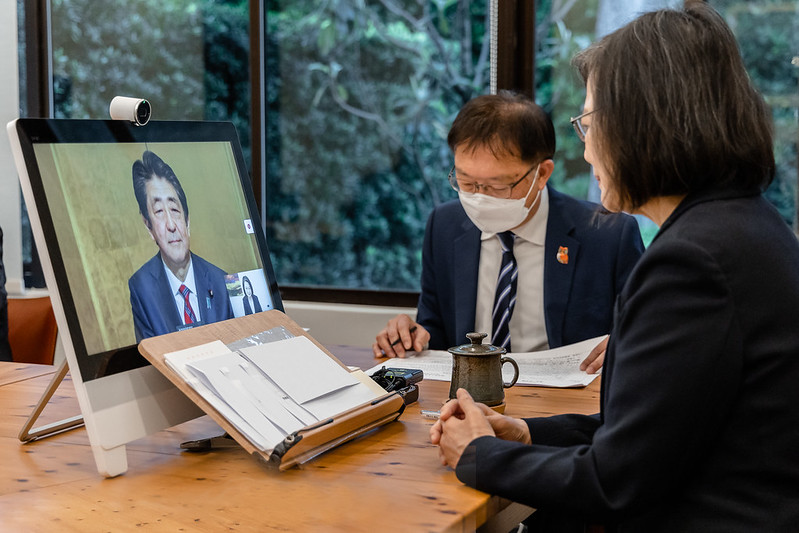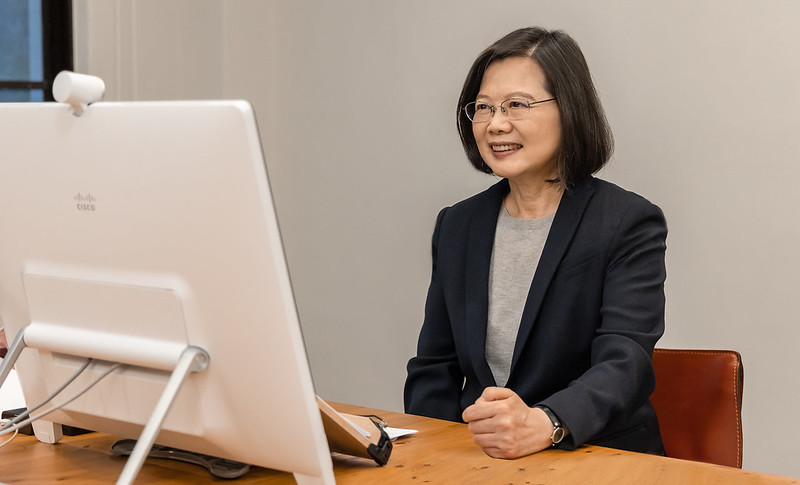News & activities
 News releases
News releases
The Japan-ROC Diet Members' Consultative Council held its annual meeting on the evening of March 22 in Tokyo, Japan, at which President Tsai Ing-wen met via videoconference with Japanese former Prime Minister Abe Shinzo. They exchanged views on a range of issues, including joint disaster and pandemic response efforts by Taiwan and Japan, Taiwan's accession to the Comprehensive and Progressive Agreement for Trans-Pacific Partnership (CPTPP), the situation in Ukraine and the region, and ensuring peace and stability under the free and open Indo-Pacific strategy.
The following is a translation of President Tsai and former Prime Minister Abe's discussion:
Former Prime Minister Abe: Long time no see. I'm very honored to meet with you again, President Tsai, and to have this opportunity to engage you in discussion. I hope all is well with you.
As you know, President Tsai, the annual meeting of the Japan-ROC Diet Members' Consultative Council takes place in Tokyo tonight. As a surprise for those in attendance at the reception following this meeting, Council Chairman Furuya Keiji, who has had the pleasure of working with you on many occasions, has specially arranged this video chat because I am an advisor to the Consultative Council. I want to thank you again for agreeing to meet with me, despite the council delaying this video chat just a bit.
President Tsai: Thank you. I'm very pleased to have this opportunity for a video chat with you, former Prime Minister Abe. Recently we have had opportunities to hold discussions, but those have all been over the phone. Talking with you today on this video call, I can see that you look to be in good spirits, and I'm very happy to see that.
When the pandemic was at its worst last year, we received assistance from Japan, including many vaccines, which helped us bring the situation under control, and in particular aided us in containing the spread of the Omicron variant. The pandemic situation in Taiwan is relatively stable, so I want to take this opportunity to thank all the members of the Consultative Council for your contributions to relations with Taiwan. I also want to thank you, Mr. Abe, as well as former Prime Minister Suga Yoshihide and current Prime Minister Kishida Fumio, for your support for Taiwan.
Former Prime Minister Abe: I remember when the pandemic first broke out, in a remarkable show of friendship, Taiwan donated large numbers of face masks and protective clothing to Japan, as well as medical devices. I am personally very grateful for this, and I'm quite sure that all my fellow Japanese citizens feel the same way. Eleven days ago marked 11 years since the March 11, 2011 earthquake and tsunami in eastern Japan. As a citizen of Japan, I will never forget the support that Taiwan provided after the disaster, and I want to thank you once again for this.
President Tsai: I strongly hope our two sides can continue working together to further develop our bilateral friendship. In the 11 years since the Fukushima nuclear accident, countries around the world have gradually eased or lifted restrictions on the import of Japanese foodstuffs. Taiwan last month announced it would ease regulations of food imports from Fukushima and the surrounding area, demonstrating our acceptance of international standards and determination to confront and resolve difficult trade issues. Economic growth and trade expansion are among the most important factors that contribute to national stability. Taiwan and Japan can work together to strengthen the economy of the Indo-Pacific region, and we hope that Japan will continue helping to facilitate Taiwan's accession to the CPTPP.
Former Prime Minister Abe: You just mentioned the CPTPP – an agreement that entered into force during my time as prime minister. The trade ministers of the 11 founding nations of the CPTPP have stated their willingness to accept the entry of new economies, as well as their firm intent to expand membership, and are now engaged in talks on this matter with the United Kingdom. We hope that, based on its acceptance of CPTPP principles and by meeting the agreement's high standards, Taiwan can join as soon as possible.
President Tsai: I'm deeply thankful for Japan's support. Taiwan and Japan have cooperated to overcome difficulties such as the COVID-19 pandemic and natural disasters. The current situation in Ukraine remains severe, and the international community has been paying close attention. The entire world has been very moved by the Ukrainian people's courage and their determination to defend their country, as well as the values of democracy and freedom. The people of Taiwan also identify very strongly with the Ukrainians. As a member of the global community of democracies, Taiwan is taking part in economic sanctions against Russia, and is providing humanitarian aid to Ukraine. Moving forward, Taiwan will continue to stand resolutely with Ukraine and behind the values of democracy and freedom.
Former Prime Minister Abe: It has already been over a year and a half since I left office as prime minister, and much has happened in this short period of time. I want to thank you for conducting a virtual dialogue during that time in your capacity as Democratic Progressive Party Chairperson with Takaichi Sanae about the election of the Liberal Democratic Party president to succeed Prime Minister Suga, for which Takaichi was a candidate. I am very happy to see that Japan and Taiwan are overcoming diplomatic and professional barriers to establish closer interaction.
As far as the situation in Ukraine that you just addressed, I personally feel that this is an invasion by Russia and a serious challenge to the international order. Japan should cooperate with the international community and apply stronger direct pressure on Russia to call a ceasefire and withdraw its troops.
President Tsai: Russia's invasion of Ukraine has challenged fundamental international principles, and has been condemned by democratic nations. This kind of unilateral use of military force to change the status quo and infringe on the sovereignty of a democratic nation absolutely cannot be permitted to occur in the Indo-Pacific region, and I firmly believe that this is the consensus among the international community. I also want to take this opportunity to thank Japan for continuing to speak out in international venues on the importance of peace and stability in the Taiwan Strait. I hope to further strengthen Taiwan-Japan exchanges and cooperation across the board, and jointly promote regional peace and stability.
Former Prime Minister Abe: Last year, at a seminar held by a Taiwan think tank, I said that if Taiwan has a problem, then Japan has a problem, and the Japan-US alliance also has a problem. Of course, this was a way of expressing my own sense of urgency, and I myself advocated for the concept of a free and open Indo-Pacific. The vast Indo-Pacific Ocean where Taiwan and Japan are located must be an ocean in which we can maintain freedom and openness under international law, and we of course must not allow changes to the status quo by unilateral military force. Therefore, I also believe that to maintain regional stability, it is important that Taiwan and Japan share intelligence.
President Tsai: Taiwan strongly agrees with the concept of a Free and Open Indo-Pacific. As a member of the Indo-Pacific region, we also look forward to contributing to regional peace and prosperity. Taiwan and Japan share the values of freedom, democracy, respect for human rights, and the rule of law; we are important trade partners and friends, as well as partners in terms of security. I believe that there is still much room for further cooperation in Taiwan-Japan relations, and I hope to continue cooperation with Japan, the US, and other like-minded countries to achieve this goal.
Former Prime Minister Abe: Thank you. There are many other topics on which I would like to exchange ideas with you, but due to time limitations, I must yield the floor for the Consultative Council's reception. I hope to have further opportunities to exchange ideas with you online. Of course, I hope even more to be able to visit Taiwan in the near future, and to once again exchange ideas with you, Madam President.
President Tsai: Thank you. I am very grateful to have this opportunity today to meet with you, former Prime Minister Abe, which was very productive. I also very much hope to have a chance to host you on a visit to Taiwan. I am sure that many people here hope to see you visit.
Here, I also want to give special thanks to Chairman Furuya Keiji for arranging today's videoconference. I am also delighted to see Representative to Japan Frank Hsieh (謝長廷) here today, as well as many Diet members who have long supported Taiwan. We hope that the pandemic will end soon, and that we will have a chance to meet all of you friends again. I wish you a successful Consultative Council annual meeting. Thank you.
Many members of the Japanese Diet participated in the meeting.










